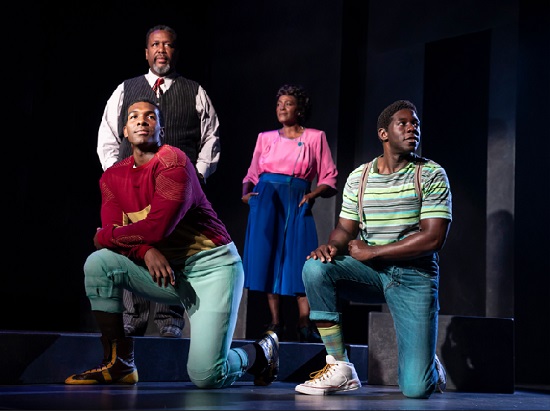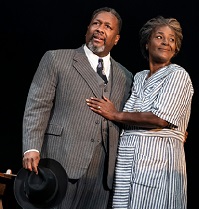Death of a Salesman

Tickets from $35 Buy Tickets

Cititour.com Review
Attention must be paid whenever Arthur Miller’s seminal 1949 drama, “Death of a Salesman,” arrives on Broadway. And this fifth-ever Broadway revival, now at the Hudson Theatre, deserves an unusual level of both respect and scrutiny as it presents the Loman family, for the first time, as African Americans in 1950s Brooklyn.
Unsurprisingly, the ultimate result of Miranda Cromwell’s often-bracing if frequently misguided production is that the Lomans’ struggle to achieve the American Dream simultaneously feels both universal, as Miller originally intended, and very race-specific. The script is left essentially intact, but there’s a different resonance to this reinvention.
Intriguingly, were it not for the blues-like music that accompanies the opening segment, one might suspect that this decidedly minimalist production -- led by the hard-working Wendell Pierce as the increasingly desperate 60ish salesman Willy Loman and the magnificent Sharon D. Clarke as his long-suffering but stalwart wife Linda -- was employing color-blind rather than color-conscious casting.
Whether it’s the right casting, aside from the peerless Clarke in stand-by-your-man mode, is another matter entirely. Pierce overplays Willy’s almost-constant anger – at life, at Linda, at his “disappointing” sons, Biff (Khris Davis) and Happy (an almost too-charismatic McKinley Belcher III) – making him less-than-sympathetic and, at times, almost insufferable. There’s some subtext in his physical portrayal that suggests this Willy may be suffering from a brain tumor or dementia, which would explain a lot of his behavior. And one can certainly argue that a Black man in 1949 Brooklyn has a lot to be angry about. But all in all, Pierce’s Willy seems to have far too much fighting spirit left for his ultimate decision to make sense.
The strapping Davis looks the part of the former high school quarterback, but for much of the play, he talks in an annoyingly mannered, almost childish voice that is probably meant to stress (unnecessarily) that he’s a 34-year-old who has never matured past the age of 17, when his life changes after a particularly upsetting encounter with Willy. Luckily, Davis comes into fiery greatness in the play’s final section, seeming to instantly become his appropriate age and stature before our eyes.
Last but not least is the great Andre DeShields, who appears periodically as the ghost of Willy’s late, ultra-successful brother Ben, gliding across the stage in all-white outfit and glittery shoes and speaking in the actor’s now-trademark “dramatic” voice. Usually, Ben feels like little more than a plot device, but the unintended effect of placing DeShields in the role is, now, I was incredibly interested to learn more about Ben and his adventures in Africa and Alaska. (As they say, there are no small parts, only small actors.)
While it’s never enunciated in any way that the Lomans are Black, the question of how their skin color affects their lives – the most-striking point about this production – eventually emerges and forces us to see the play in a different light, which is the strongest aspect of the production.
For example, when Willy’s arrogant boss Howard (the excellent Blake DeLong) fires him – putting the figurative nail in Willy’s coffin – is he, as in other productions, just tired of dealing with a “leftover” from his father’s regime, or is there some racist motivation? Is Willy’s affair with a white female buyer in Boston (a fine Lynn Hawley) not just potentially self-destructive to his wife (should Linda find out) but his physical well-being. (Interracial relationships may not have been illegal, but it’s unlikely anyone would have looked on them favorably). And when we learn from Biff’s childhood friend Bernard (an effective Stephen Stocking) that their presumably white math teacher, Mr. Birnbaum, refuses to fudge with Biff’s grades so he can graduate on time, we wonder if it’s pure principle or malice.
After nearly 75 years, it’s a blessing that Miller’s landmark drama is being allowed to shine in a different light, even if we’re asked to ignore some blind spots.
By Brian Scott Lipton
Visit the Site
https://www.salesmanonbroadway.com/
Open/Close Dates
Opening 10/9/2022
Closing 1/15/2023
Theatre Info
Hudson Theatre
139-141 West 44th Street
New York, NY 10036
Map
Comments


 Sign up for our newsletter !
Sign up for our newsletter !